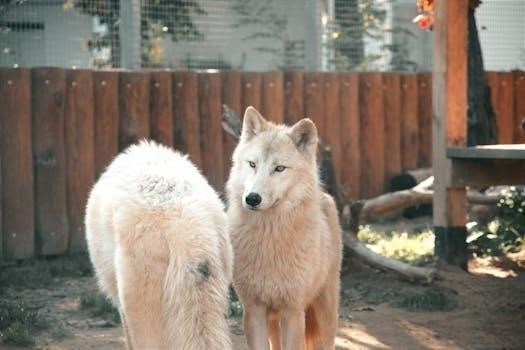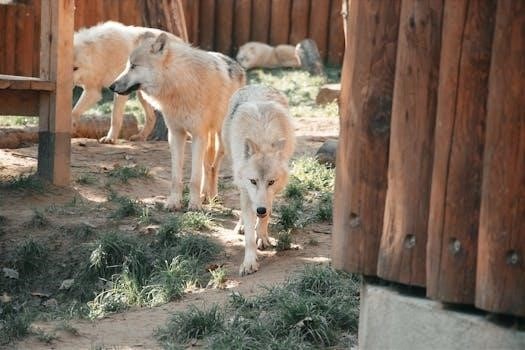The Wolves⁚ An Overview
Sarah DeLappe’s play, “The Wolves,” premiered Off-Broadway in 2016. It centers around a girls indoor soccer team during their Saturday morning pre-game warmups, showcasing their complex relationships and conversations.
Play’s Premise and Setting
“The Wolves” is set during the Saturday morning warm-up sessions of a girls indoor soccer team. The play unfolds within the confines of their suburban stretch circle, where the nine teenage girls engage in a dynamic and overlapping dialogue. These pre-game rituals become a stage for exploring their individual and collective experiences. The setting is a space where the girls navigate not only their athletic pursuits but also the complexities of adolescence, identity, and their relationships with one another. Their interactions, ranging from lighthearted banter to more serious discussions, reveal the multifaceted nature of their lives. The play is a portrait of young women on the cusp of adulthood, grappling with big questions and small battles.

Characters and Dynamics
The play features nine teenage girls on a soccer team, each with distinct personalities. Their interactions reveal complex relationships, marked by overlapping dialogue and shifting alliances.
The Nine Teenage Girls
“The Wolves” presents a diverse group of nine teenage girls, each a member of an indoor soccer team, identified primarily by their jersey numbers rather than names. These girls, ranging in age, display distinct personalities and backgrounds, from the brainy and morbid Midfield #11 to the stoner #13; There is the captain and coach’s daughter #25. The new girl on the bench is #46. This diverse group navigates the complexities of adolescence and team dynamics. These young women engage in conversations covering a wide spectrum of topics, showcasing their individual concerns, opinions, and developing worldviews. They are not simply defined by their roles on the team; instead, their interactions reveal the rich tapestry of their individual lives and the shared experience of growing up.
Overlapping Dialogue and Complex Relationships
DeLappe’s play utilizes overlapping dialogue to create a realistic portrayal of the girls’ interactions, mirroring the way teenagers communicate in real life. This technique reflects the fast-paced, often chaotic nature of their conversations. The overlapping lines create a sense of immediacy, where multiple thoughts and feelings are expressed at once. This style of conversation reveals the complex, often shifting dynamics between the team members. These relationships are not simplistic; they involve moments of camaraderie, conflict, and subtle power struggles. The girls support each other, but also compete, tease, and misunderstand each other, creating a rich portrayal of their evolving connections. Through overlapping lines, DeLappe showcases the nuances of their friendships and rivalries.

Themes and Topics
The play explores adolescence, identity, and the girls’ navigation of big questions and small battles. Social and political issues also surface through their rapid-fire, unfiltered conversations.
Adolescence and Identity
“The Wolves” delves deeply into the complexities of adolescence, portraying the girls as they grapple with forming their individual identities within the context of their team. Their conversations, often overlapping and unfiltered, reveal their insecurities, aspirations, and evolving perspectives. The play captures the raw energy and vulnerability of teenage girls on the brink of adulthood as they navigate the challenges of self-discovery. It explores how they use the team dynamic and their shared experiences to define themselves, showcasing the push and pull between individual desires and group belonging. The play provides a nuanced look at their developing identities, presenting them not just as athletes, but as complex individuals wrestling with the pressures and expectations of growing up. Their constant banter and exploration of diverse topics demonstrate the multifaceted nature of teenage identity, where personal beliefs and social consciousness intersect and collide.
Big Questions and Small Battles
Within their suburban stretch circle, the girls in “The Wolves” engage in both profound philosophical inquiries and petty squabbles, showcasing the duality of their teenage experience. They tackle significant issues like genocide, war crimes, and social justice alongside trivial disagreements about tampons, birth control, and pop culture. These seemingly disparate topics create a dynamic interplay, reflecting the girls’ evolving awareness of the world and their place within it. The play captures the essence of adolescence, where big questions about life, liberty, and the pursuit of happiness coexist with the daily battles of friendships and team dynamics. Their rapid-fire conversations reveal how they process complex ideas and small personal conflicts with equal intensity, underscoring the chaotic and transformative nature of growing up. This juxtaposition of weighty and mundane reflects the reality of teenage life, where the smallest issues can feel monumental.
Social and Political Issues
“The Wolves” subtly weaves in social and political issues through the girls’ unfiltered conversations. Topics like war crimes, genocide, and racism are brought up organically, reflecting the girls’ awareness of current events and their place within a larger global context. These discussions, often interwoven with their everyday banter, highlight the way teenagers process complex issues and form their own opinions. The play does not shy away from addressing these heavy subjects, showcasing how they are often intertwined with personal experiences and perspectives. Through these conversations, DeLappe explores the way young people engage with and navigate the complexities of the world around them. Furthermore, the play touches on themes of social dynamics within the team, reflecting the power structures and hierarchies that exist within adolescent social groups.

Production and Reception
“The Wolves” premiered Off-Broadway in 2016 to great acclaim. It had two sold-out, extended runs and was later streamed during the pandemic, reaching a wider audience.
Off-Broadway Premiere and Acclaim
“The Wolves” made a significant impact with its Off-Broadway debut at The Duke on 42nd Street in September 2016, produced by The Playwrights Realm. The play garnered enthusiastic acclaim, quickly becoming one of the most talked-about new works of the 2016 season. Its initial run was so successful that it led to two sold-out, extended engagements, demonstrating the immediate resonance it had with audiences. The production was praised for its authentic portrayal of teenage girls and its unique, overlapping dialogue style; It earned multiple nominations, including the Lortel and Outer Critics Circle awards, solidifying its position as a critical and popular success in the New York theatre scene. It also received recognition through the Relentless Award, and the Sky Cooper New American Play Prize.
Streamed Production During Pandemic
The production of “The Wolves” faced an unexpected shift when the COVID-19 pandemic forced the cancellation of its live, in-person performances. In response, the play was adapted for a streamed format, bringing the compelling narrative of the girls’ soccer team directly into homes everywhere. This digital adaptation offered a unique viewing experience, moving the characters from the physical stage to familiar “Brady Bunch Zoom boxes.” While the transition presented challenges, it also allowed the play to reach a broader audience during a time when live theatre was largely inaccessible. This streaming version highlighted the versatility of DeLappe’s work and its ability to resonate even beyond the traditional theatrical setting. The adaptation underscored the play’s impact and continued relevance.

Critical Analysis
“The Wolves” is lauded for its unique dialogue, capturing the raw energy of adolescence. It explores complex themes, making it a powerful and important work in contemporary theater.
DeLappe’s Unique Writing Style
Sarah DeLappe’s writing in “The Wolves” is characterized by its realistic and overlapping dialogue, mirroring the way teenagers actually converse. The rapid-fire exchanges create a sense of immediacy and authenticity, immersing the audience in the girls’ world. Her style avoids traditional exposition, instead revealing character and relationships through these natural, often fragmented, conversations. DeLappe masterfully uses this technique to explore complex issues, from lighthearted banter to more serious topics, without ever feeling forced or contrived. This creates a unique theatrical experience that feels both intimate and compelling. The result is a play that pulsates with the energy and vitality of its teenage characters, making it both engaging and thought-provoking for audiences.
Impact and Importance of the Play
“The Wolves” has had a significant impact, earning acclaim and numerous awards, including a Pulitzer Prize nomination. The play’s importance lies in its authentic portrayal of teenage girls, moving beyond stereotypes to present them as complex individuals grappling with identity, relationships, and the world around them. It provides a platform for their voices and experiences, which are often underrepresented in mainstream theatre. The play also tackles significant social and political issues through the lens of these young women, encouraging audiences to engage with these topics in a new light. Its success has highlighted the need for more female-driven narratives and diverse representation on stage, making a lasting mark on contemporary theatre.



